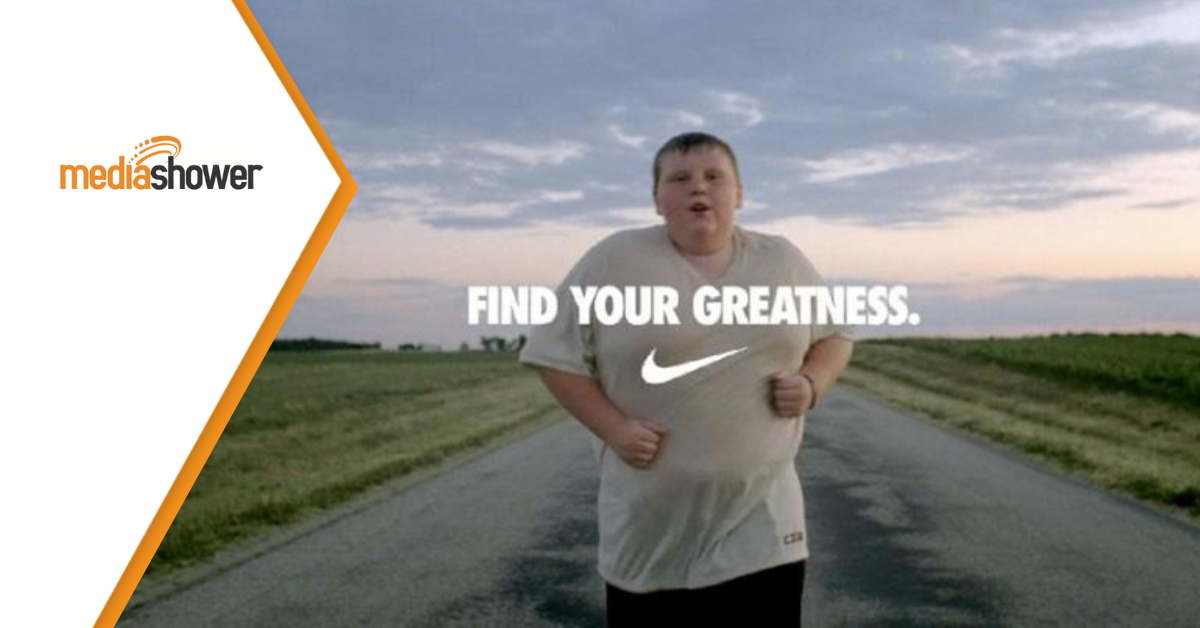
TLDR: Nike’s “Find Your Greatness” campaign focused on everyday athletic achievement to motivate its fans to meet their goals, however modest.
So What? By shifting the spotlight away from famous athletes and towards the efforts everyday people put into their sports, it started a conversation about exercise and making it more celebrated and accessible.
Perhaps you’ve heard of “ambush marketing,” where a brand attempts to associate itself with an event already sponsored by another brand.
That’s how Nike found itself during the 2012 Summer Olympics. While many brands had been selected as official partners of the Games, Nike wasn’t one of them–but Adidas was.
And, per Olympic guidelines, ambush marketing is a massive no-no. No brand was allowed to use trademarks like the Olympic Rings or athletes in an advertising campaign, unless you were an official partner.
This presented a significant problem for Nike, a brand nearly synonymous with athletic achievement.
By 2012, Nike had a string of famous ad campaigns with the world’s greatest athletes, from Michael Jordan to Bo Jackson to Kobe Bryant.
Nike’s solution? Focusing on the ideas behind the Olympics, without explicitly talking about the Olympics. The result was a campaign called “Find Your Greatness,” which embraced the challenges everyday people overcome as they play the sports they love.
Here’s what made “Find Your Greatness” so great.
An Olympics Ad That Didn’t Mention the Olympics
This campaign is a masterclass in talking about the Olympics without talking about the Olympics.
Take what is perhaps the most notable video from this campaign, “The Jogger:”
The ad is a single shot of Nathan Sorrell of London, OH. Nathan is a larger boy, and as he jogs down the street, he is visibly sweating and winded.
As Nathan jogs towards the camera, we hear the following monologue, delivered by actor Tom Hardy:
“Greatness. It’s just something we made up. Somehow we’ve come to believe that greatness is a gift reserved for a chosen few, for prodigies, for superstars, and the rest of us can only stand by watching.
You can forget that. Greatness is not some rare DNA strand. It’s not some precious thing. Greatness is no more unique to us than breathing. We’re all capable of it. All of us.”
The only audio beyond the voiceover is the ambient sounds of an Ohio morning and Sorrell’s steady pace as he jogs on the road, with his jogging steadily rising in the mix. Similarly, the text is sparse, with only “Find your greatness” and the Nike logo at the very end.
This video ad is notable in its context. Released during the Olympic Games, it speaks to the core ideas behind those games: namely, achievement and “greatness.”
Nike adopts this idea and creates a striking message for its audience. You don’t have to be an athlete who trains every day for years, and you don’t need to be a star with endorsement contracts to achieve something amazing.
The ad is subtle, because it never mentions the games. Yet, as millions watched the ad during the Olympics, they associated this idea (achievement and greatness) as an “Olympic” idea.
The simplicity carries so much meaning and yet is also incredibly clever. Nike released an Olympics commercial without mentioning the Olympics.
Contrasting Olympic Athletes with the Rest of Us
This particular ad is quite short, but it’s part of a larger campaign showing the same sentiment:
A young man bounces three basketballs simultaneously in one vignette before ending on a handstand. Hardy provides the voiceover:
“Sometimes, greatness is overcoming adversity. Sometimes, it’s just fun.”
Another shows a young girl performing cartwheels on her front lawn. The voiceover says simply:
“Greatness isn’t always measured in tenths of a point. It’s a bit bigger than that.”
Yet another shows an older man lifting weights, clearly sweating and straining against the effort. The voiceover says:
“Some measure greatness in precious metals. Like iron.”
The message is clear and clever: Nike can’t mention the Olympics but makes backhand allusions to them through references to audiences, metals/medals, points, and so on. The contrast between the Olympic Games and these “amateur” games is clear.
Is this negative campaigning? Some may see it that way. It was also a brilliant way to get around the Olympic guidelines against ambush marketing, creating an identification between consumers and athletics that wasn’t rooted in huge branding or superstar athletes.
The message is clear: true greatness is available to everyone, every day. All of us have the potential to do something great.
Turning a Restriction Into Creative Greatness
The lack of Olympic branding could have been a devastating loss for Nike. How could the biggest athletic brand miss out on the biggest athletic event held every four years?
Nike spun that problem on its head. With attention to simplicity and creating a connection with “amateur” athletes, they pushed a fantastic campaign, leveraged awareness of the games, and empowered the everyday users of Nike products.
What communicators can learn from this campaign:
- Think outside the rules: When faced with limitations, look for creative solutions. Nike couldn’t use Olympic imagery, so they focused on the core concepts of the games and connected with everyday athletes.
- Embrace the power of storytelling: A compelling narrative can resonate with your audience and leave a lasting impression. The “Find Your Greatness” campaign used a simple message and relatable characters to inspire viewers.
- Focus on your audience: Understand what motivates your target demographic and tailor your message accordingly. Nike didn’t focus on elite athletes, they highlighted the potential for greatness in everyone.
Do you need help planning and executing your next brilliant campaign? Try our AI-powered marketing brief generator.
